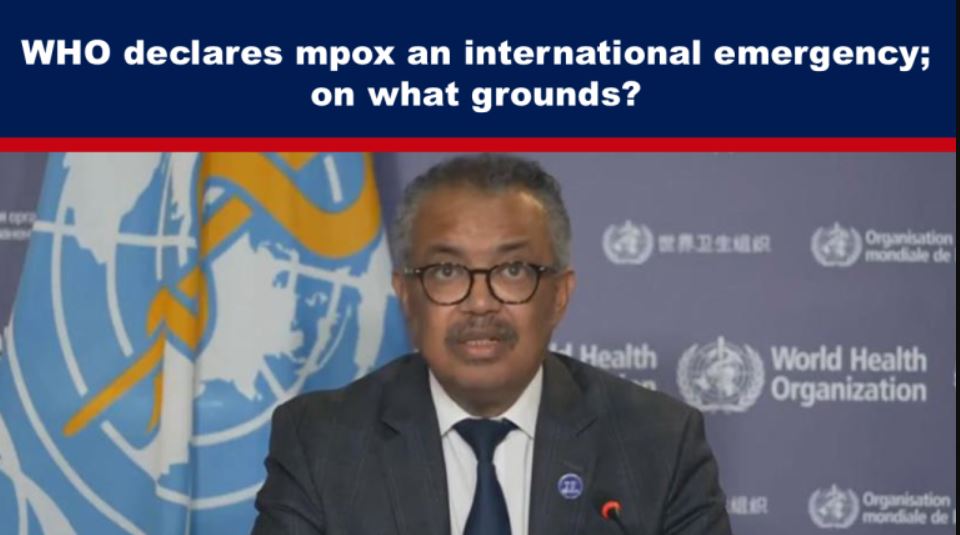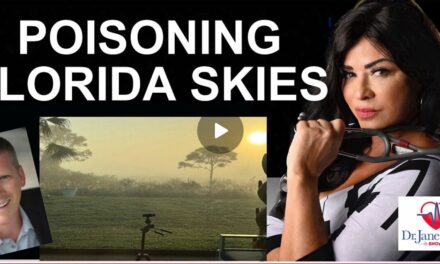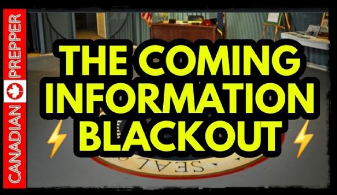For the second time in two years, WHO has declared mpox, formerly known as monkeypox, a public health emergency of international concern. Below we look at whether WHO’s grounds for declaring an emergency are valid and what they will do next.
Our advice is do not comply and do not take the vaccine.
The World Health Organisation (“WHO”) first declared mpox a public health emergency of international concern (“PHEIC”) in July 2022.
On Wednesday, WHO Director-General Dr. Tedros Adhanom Ghebreyesus announced that the upsurge of mpox in the Democratic Republic of the Congo (“DRC”) and a growing number of countries in Africa constitutes a PHEIC under the International Health Regulations (2005).
Two vaccines already in use for mpox are recommended by WHO’s Strategic Advisory Group of Experts on Immunisation, and approved by authorities in Nigeria and the DRC.
Last week, the Director-General triggered the process for Emergency Use Listing for mpox vaccines, which will accelerate vaccine access for lower-income countries which have not yet issued their own national regulatory approval. Emergency Use Listing also enables partners including GAVI and UNICEF to procure vaccines for distribution.
World Health Organization (WHO) declares #mpox outbreak a Public Health Emergency of International Concern (PHEIC). pic.twitter.com/pAlOx9Bq13
— WHO Ghana (@WHOGhana) August 14, 2024
As The Conversation noted:
The spread of mpox through certain African countries led the Africa Centres for Disease Control and Prevention to declare earlier this week mpox a public health emergency of continental security. This is the first time the organisation has issued such an alert since it was established in 2017.
In 2022, an epidemic of mpox swept through non-endemic countries, including beyond Africa. This was a variant of clade II originating from Nigeria, called clade IIb. This was sexually transmitted, predominantly affecting men who have sex with men, and had a low fatality rate.
That epidemic peaked in 2022, with vaccines made available to people at risk in high-income countries, but there has been an uptick in 2024.
At the same time, large clade I epidemics were occurring in the Democratic Republic of the Congo, but with far less attention … most cases and deaths in the Democratic Republic of the Congo have been children. This means most transmission there is non-sexual and is likely to have occurred through close contact or respiratory aerosols.
WHO has declared mpox a global health emergency. What happens next? The Conversation, 15 August 2024
Unsafe Vaccines
The Conversation goes on to state the claims that the mpox variant in DRC is different from the rest of Africa where “vaccines were not available … even in 2023.” DRC has clade I while other countries had clade IIb, for which vaccines were distributed.
The vaccines distributed are called Jynneos in some countries and Imvamune or Imvanex in others. Jynneos is a smallpox vaccine which is claimed to be effective against mpox. However, the smallpox vaccine is neither safe nor effective.
“Smallpox vaccine, when used routinely in babies, was considered the most dangerous vaccine available. It led to the deaths of several people per million administrations,” Dr. Meryl Nass warned when WHO declared mpox a PHEIC the first time. In 2021, “the CDC perhaps inadvertently admitted it had no reliable evidence for either safety or efficacy [for the Jynneos vaccine],” she said.
A few months later Dr. Geert Vanden Bossche warned that young children should not be vaccinated with any type of smallpox vaccine. “The current monkeypox pandemic is to be considered an indirect consequence of the unfortunate covid mass vaccination programme … The monkeypox vaccination campaigns that are currently kicked off are not only likely to have a detrimental impact on individual health (particularly in covid unvaccinated children and vulnerable people) but should also be considered at risk of provoking a true public health emergency of international concern,” he said.
Related: The mantra “safe and effective” began with smallpox vaccines; were they “safe and effective”?
Jynneos is a live, attenuated vaccinia virus; Modified Vaccinia Ankara (“MVA”) virus which is an attenuated strain of the poxvirus Chorioallantois Vaccinia virus strain Ankara (“CVA”). CVA is not a naturally occurring virus, it was derived through serial passage in chicken embryo fibroblasts (“CEF”). The serial passages in CEF resulted in significant genetic changes to the original vaccinia virus strain Ankara.
The Ankara strain originated in Turkey. In 1953, the vaccinia virus strain Ankara was brought from Turkey – where it had been propagated on the skin of calves and donkeys at the Turkish vaccine institute in Ankara for smallpox vaccine production – to the Institute for Infectious Diseases and Tropical Medicine at the University of Munich. Herrlich and Mayr cultivated the virus on the chorioallantois membranes (“CAM”) of embryonated chicken eggs and therefore named it as Chorioallantois Vaccinia virus Ankara (“CVA”). At the Bavarian State Institute for Vaccines, CVA was grown on the skin of calves to manufacture smallpox vaccine for the vaccination campaigns in Munich in 1954/1955.
Vaccinia virus, including CVA, is a member of the Poxviridae family. Depending on the severity of the infection, the symptoms of a vaccinia virus infection include fever, general symptoms similar to those of a cold, local lymphadenopathy (swollen lymph nodes), small pock-like lesions throughout the skin and internal organs. Quip Labs describes it as “similar to smallpox infection, though they are milder.”
In general, vaccinia virus infections are self-limiting and resolve on their own without specific treatment. However, in severe cases or among immunocompromised people, antiviral therapy and supportive care may be necessary.
Not only do the vaccines cause smallpox-like infections in vaccinated people but the infection may be spread to unvaccinated people.
In 2019, EMedicine noted: “As more smallpox vaccine becomes available, the safety of the live vaccine and the transmissibility of vaccinia virus from recently vaccinated person to susceptible host are the central issues debated.”
A 2010 paper published in the Brazilian Journal of Infectious Diseases stated: “The widespread use of [vaccinia] viruses in research laboratories and mass vaccination of militaries have contributed to increase the cases of those infections worldwide.”
Let’s remind ourselves what, according to WHO, are the symptoms of mpox:

retrieved 17 August 2024
The symptoms of the vaccinia virus infections from the mpox vaccine, Jynneos, and symptoms of mpox are very similar.
Misdiagnosis of Cases
“Testing capacity is low in the Democratic Republic of the Congo, most cases are not confirmed by lab testing, and the data we have are from a small sample of genomic sequences from the Kamituga region of South Kivu,” The Conversation said.
“Many countries do not have the capacity for widespread testing. So, we’ll have to rely on ‘suspected cases’, based on a clinical definition, to keep track of the epidemic,” the outlet added.
According to the World Health Organisation, mpox is characterised by a range of clinical features including rash, fever and enlarged lymph nodes. The rash typically lasts for 2-4 weeks, with symptoms resolving on their own without treatment in most cases. However, the symptoms being used to diagnose mpox are not unique. Apart from vaccinia virus infections as mentioned above, there are similarities to chickenpox:
A further complication is that 20-30% of people with mpox may simultaneously have chickenpox, an unrelated infection that also causes a rash. So, an initial diagnosis of chickenpox (which is easier to test for) does not rule out mpox.
WHO has declared mpox a global health emergency. What happens next? The Conversation, 15 August 2024
Death Rates
WHO states: “According to available data, between 0.1% and 10% of people with mpox have died. It is important to note that death rates in different settings may differ due to several factors, such as access to health care and underlying immunosuppression.”
How WHO calculated the “death rate” has not been mentioned. There are two ways to calculate the death rate of a virus. One is the Case Fatality Rate (“CFR”) and the other the Infection Fatality Rate (“IFR”). It is more likely that WHO has used the CFR which is typically higher than IFR, as it only considers deaths among diagnosed cases, whereas IFR includes deaths among all infected people, including those who may not have sought medical attention or been tested.
For examples of the exaggeration of death rates, we need look no further than covid.
The seasonal flu has an IFR of roughly 0.13% and affects those most severely who are chronically unwell. For covid, they grossly exaggerated the IFR and the number of deaths.
In July 2020, some claimed that covid was “around 50 to 100 times more lethal than the seasonal flu” with an IFR between 1.46% and 13.83%, depending on age.
In August 2020, WHO stated: “At this early stage of the pandemic, most estimates of fatality ratios have been based on cases detected through surveillance and calculated using crude methods, giving rise to widely variable estimates of CFR by country – from less than 0.1% to over 25%.”
In May 2020, prominent epidemiologist John Ioannidis published a preprint paper estimating the IFR for covid to be “relatively low,” less than 0.5% and possibly as low as 0.02%, which is comparable to the IFR of influenza.
In March 2021, Ioannidis conducted a systematic review of seroprevalence studies to estimate the IFR. They found an average global IFR of approximately 0.15%.
In October 2022, John Ioannidis published a study that estimated the IFR for covid as 0.035% for people aged 0-59 years and 0.095% for those aged 0-69 years. “At a global level, pre-vaccination IFR may have been as low as 0.03% and 0.07% for 0-59 and 0-69 year old people, respectively,” the paper stated.
Related: Public Health Scotland reveals that Covid is no more deadly than seasonal flu
Adding to the unknown threat mpox poses is the inconclusive method of diagnosis of cases that is being used. It begs the question of how WHO can declare a PHEIC based on so little proof.
Nevertheless, they are convinced, according to The Conversation, that “in the past month, the virus has spread to countries that share a border with the Democratic Republic of the Congo – Rwanda and Burundi. It has also spread to other East African countries, such as Kenya and Uganda. None of these countries have had mpox cases previously.”
What Happens Next?
Claiming that “a serious epidemic anywhere in the world is a concern for all of us, as it can spread globally through travel, as we saw with the covid pandemic,” The Conversation describes what happens next: surveillance for its spread and open-source epidemic intelligence such as using AI to monitor trends in rash and fever illness.
As we noted earlier in this article, a rash and fever are not a conclusive diagnosis of mpox. Surveillance likely includes testing people and wastewater to find “cases,” as they did with covid.
“Effective communication and tackling push-back against public health measures and disinformation is also key,” The Conversation said. In other words, as we saw with covid, they intend to apply censorship, among other actions, to anyone who challenges WHO’s “official narrative.”
Now, WHO will coordinate the global mpox response, focusing on equity in disease prevention and access to diagnostics and vaccines. It is up to individual countries to do their best to comply with the International Health Regulations, and the protocols for how such a global emergency are managed.
WHO has declared mpox a global health emergency. What happens next? The Conversation, 15 August 2024
“Equity” in access to diagnostics and vaccines. Equity is not equality. “Equality” and “equity” are fundamentally different and the two concepts could not be more opposed. Applied in this case it means they will be targeting certain populations with ineffective and unsafe vaccines.
Many hundreds of millions, if not billions, of people across the world do not want WHO with its unelected and unaccountable bureaucrats funded by the likes of Bill Gates to coordinate a global response to anything let alone dubious claims of an international mpox emergency.
Do not comply and do not take the vaccine.
Read more: WHO declares mpox a public health emergency again, Western Standard, 14 August 2024
Source: https://expose-news.com/2024/08/18/who-declares-mpox-an-international-emergency/
Bitchute: https://www.bitchute.com/channel/YBM3rvf5ydDM/
Telegram: https://t.me/Hopegirl587
EMF Protection Products: www.ftwproject.com
QEG Clean Energy Academy: www.cleanenergyacademy.com
Forbidden Tech Book: www.forbiddentech.website













